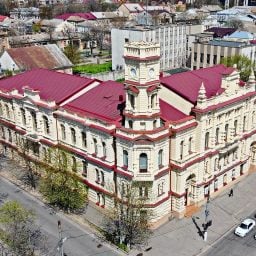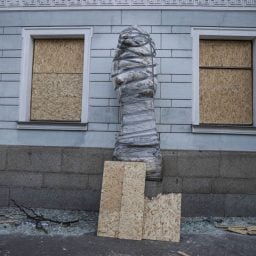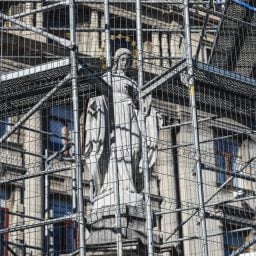On October 19, Vladimir Putin imposed martial law in four Ukrainian territories illegally annexed by Russia. When he did so, he also effectively legalized the looting of cultural heritage in Ukraine, the Art Newspaper points out.
Per Russian law, the declaration of martial law grants the country the power to “evacuate” items of economic, social, and cultural significance. Kherson, Zaporizhzhia, Donetsk, and Luhansk are the four regions specified in Putin’s decree.
However, looting has taken place in the occupied Ukrainian territories now for months.
Russian forces have already forcefully commandeered the Shovkunenko Regional Art Museum in the city of Kherson, and a similar fate likely awaits dozens of other institutions in the four annexed regions, including the Kherson Regional Art Museum, the Donetsk Republican Art Museum, and the Luhansk Art Museum.
In Kherson, occupiers have also dismantled Soviet-era monuments to 18th-century Russian military heroes Aleksandr Suvorov, Fyodor Ushakov, and Vasily Margelov.
Russian troops removed a 21st-century replica of an 1823 statue depicting Prince Grigory Potemkin, who engineered the annexation of Crimea from the Turks in 1783. Soldiers also exhumed Potemkin’s bones from St. Catherine’s Cathedral in Kherson and transported them further into Russian-held territory, according to CNN.
On October 15, ahead of Putin’s martial law announcement, the Ukrainian ministry of Culture declared that the “evacuation” of Crimean museums will be considered a “war crime.”
“Mass removal of cultural values from the territory of Ukraine by the Russian occupiers will be comparable to the looting of museums during World War II and should be qualified accordingly,” the ministry’s statement read, citing the Hague Convention for the Protection of Cultural Property in the Event of Armed Conflict.
“The actions of the Russian Federation are a violation of international law… Any seizure, destruction or willful damage to religious, charitable, educational, artistic and scientific institutions, historical monuments, works of art and science is prohibited and should be subject to prosecution.”
The culture ministry concluded with a plea to Unesco and “all international partners” to “prevent another violation of international law by the aggressor state,” to “refuse cooperation with Russian museums,” and to “counter the illegal traffic of cultural values.”
Mykhailo Podolyak, a senior adviser to Ukrainian President Volodymyr Zelensky, took to Twitter to say that the martial law decree should only be considered a”pseudo-legalization of looting of Ukrainians’ property.”
“This does not change anything for Ukraine,” Podolyak wrote. “We continue the liberation and deoccupation of our territories.”
More Trending Stories:
In a ‘Once-in-a-Lifetime’ Discovery, Swedish Archaeologists Have Unearthed a Cache of Viking Silver That Still Looks Brand New
Sarah Biffin, the Celebrated Victorian Miniaturist Born Without Hands, Is Now Receiving Her First Major Show in 100 Years
A Painting the National Gallery Determined Was Not by Vermeer Will Be Displayed In the Rijksmuseum’s Vermeer Mega-Show Anyway
It Took Eight Years, an Army of Engineers, and 1,600 Pounds of Chains to Bring Artist Charles Gaines’s Profound Meditation on America to Life. Now, It’s Here
‘I’ll Have Terrific Shows Posthumously,’ Hedda Sterne Said. She Was Right—and Now the Late Artist Is Getting the Recognition She Deserved
Click Here to See Our Latest Artnet Auctions, Live Now









